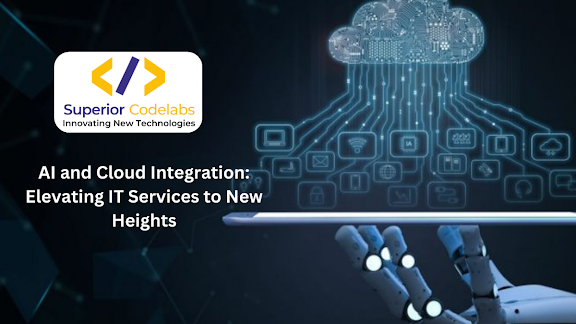AI and Cloud Integration: Elevating IT Services to New Heights
In the ever-evolving landscape of information technology, the integration of Artificial Intelligence (AI) and cloud computing has emerged as a game-changer. This powerful combination is reshaping the way businesses manage their IT services, offering scalability, efficiency, and innovation like never before. In this article, we’ll explore how AI and cloud integration are transforming IT services and why it’s crucial for businesses to embrace this transformative trend.
The Synergy of AI and Cloud Computing
AI and cloud computing might seem like disparate technologies, but their synergy is undeniable. AI brings intelligent automation and data-driven insights, while the cloud offers scalable, on-demand computing resources. Together, they create a dynamic duo that has a profound impact on IT services.
Improved Scalability
One of the most significant advantages of cloud computing is its scalability. With AI integrated into cloud platforms, businesses can seamlessly scale their IT resources up or down based on demand. This flexibility is especially crucial in today’s rapidly changing business environment, where spikes in data processing needs or sudden shifts in customer demand can occur unexpectedly.
Enhanced Efficiency
AI algorithms excel at optimizing processes, making them more efficient and cost-effective. When integrated into cloud infrastructure, AI can automate routine IT tasks, such as resource provisioning, monitoring, and security management. This not only reduces human intervention but also minimizes the chances of errors and downtime, resulting in higher system reliability.
Data-Driven Insights
The cloud provides a vast repository for storing and processing data, and AI excels at deriving insights from this data. By analyzing massive datasets in real-time, AI can help businesses make data-driven decisions, identify trends, and predict future challenges or opportunities. This is particularly valuable for IT services, where proactive maintenance and problem-solving can prevent disruptions.
Security and Compliance
Security is a paramount concern in IT, and AI-powered tools can bolster defenses. AI algorithms can continuously monitor network traffic, detect anomalies, and identify potential security breaches. When integrated with cloud security solutions, AI can enhance threat detection and response, helping businesses stay ahead of cyber threats.
Innovation Acceleration
AI and cloud integration pave the way for innovation by lowering the barriers to entry for businesses of all sizes. Smaller companies can access cutting-edge AI capabilities and computational power without the need for massive infrastructure investments. This democratization of technology fosters creativity and competition, driving IT services to new heights.
Cost Optimization
Cost management is a perpetual concern for IT departments. AI can assist in cost optimization by analyzing usage patterns and recommending resource adjustments. Cloud platforms offer pay-as-you-go pricing models, ensuring that businesses only pay for the resources they use, further optimizing IT spending.
Conclusion
AI and cloud integration are transforming IT services into dynamic, efficient, and innovative engines that drive business success. The synergy of these technologies provides scalability, efficiency, and insights that were once unimaginable. Embracing this trend is not a choice but a necessity for businesses aiming to stay competitive in the digital age.
As businesses continue to adapt to ever-changing market conditions and customer expectations, those that harness the power of AI and cloud integration will be well-positioned to lead the way in the IT services landscape. This transformative partnership is not just elevating IT services; it’s propelling businesses to new heights of success.
For more information, visit Superior Codelabs.
Shaikh Fakruddin is the Founder and CEO of Superior Codelabs.




Comments
Post a Comment